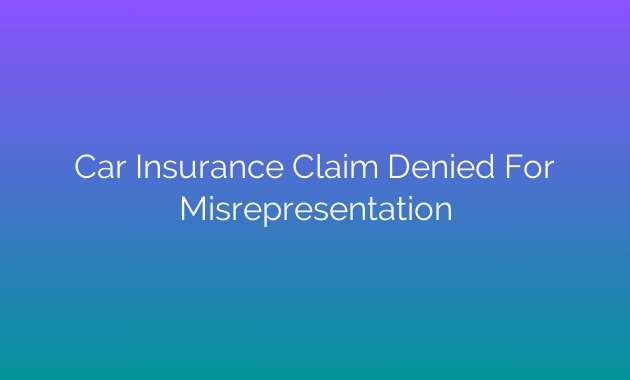Car Insurance Claim Denied For Misrepresentation
Getting involved in a car accident can be a stressful and overwhelming experience. In such unfortunate situations, having car insurance provides a sense of security and financial support. However, there are instances where car insurance claims can be denied, especially when misrepresentation is involved. When an insurance company denies a claim due to misrepresentation, it means that the policyholder has provided false or misleading information during the application process or when filing the claim.
Understanding Misrepresentation in Car Insurance
Car insurance policies require applicants to provide accurate and truthful information about various aspects, including personal details, driving history, and vehicle information. Misrepresentation occurs when an applicant knowingly or unknowingly provides incorrect information that affects the insurance company’s decision to provide coverage or pay out a claim.
Misrepresentation can take various forms, such as:
– Providing false details about previous accidents or traffic violations.
– Failing to disclose modifications made to the vehicle.
– Misrepresenting the primary usage of the vehicle (e.g., stating it is for personal use when it is primarily used for commercial purposes).

– Withholding information about other drivers who regularly use the insured vehicle.
Reasons for Car Insurance Claim Denial
Insurance companies have specific policies and guidelines to follow when assessing claims. If misrepresentation is detected, they may deny the claim based on the following reasons:
1. Material Misrepresentation: When the false or incorrect information provided by the policyholder is considered significant and would have influenced the insurer’s decision to provide coverage.
2. Breach of Policy Conditions: If the policyholder fails to abide by the terms and conditions outlined in the insurance policy, the claim may be denied. This includes actions such as driving under the influence, using the vehicle for illegal activities, or not reporting the accident promptly.
3. Fraudulent Claims: In some cases, policyholders may intentionally provide false information to receive a claim payout. Insurance companies have strict measures to identify and investigate fraudulent claims, leading to claim denial.
Consequences of Claim Denial
When a car insurance claim is denied for misrepresentation, the policyholder may face several consequences:
1. Out-of-Pocket Expenses: Without the insurance company’s financial support, the policyholder is responsible for covering the expenses related to repairs, medical bills, and other damages resulting from the accident.
2. Policy Cancellation: Insurance companies have the right to cancel the policy if misrepresentation is discovered. This can make it challenging for the policyholder to obtain coverage with other insurance providers in the future.
3. Legal Issues: If the misrepresentation is considered fraudulent, the policyholder may face legal consequences, such as fines or even criminal charges.
Tips to Avoid Claim Denial
It is essential for policyholders to provide accurate and truthful information when applying for car insurance and filing a claim. To avoid claim denial due to misrepresentation, consider the following tips:
1. Double-Check Information: Before submitting an application or claim, carefully review the information provided to ensure its accuracy. Take the time to gather all necessary documents and details to provide the most accurate information possible.
2. Be Transparent: Disclose any relevant information, including previous accidents, traffic violations, modifications to the vehicle, and additional drivers who regularly use the insured vehicle.
3. Prompt Reporting: Report any accidents or incidents to the insurance company promptly, following the policy’s guidelines. Delayed reporting may raise suspicion and lead to claim denial.
4. Seek Professional Advice: If you are unsure about any aspect of the insurance application or claim process, consider consulting an insurance professional who can provide guidance and ensure accurate representation.
Conclusion
When it comes to car insurance claims, honesty and accuracy are crucial. Misrepresentation can lead to claim denial and have significant financial and legal consequences for policyholders. By providing truthful information, promptly reporting accidents, and following the policy’s terms and conditions, policyholders can avoid claim denial and ensure a smooth claims process.
Frequently Asked Questions about Car Insurance Claim Denied For Misrepresentation:
1. What is misrepresentation in car insurance?
Misrepresentation in car insurance refers to providing false or misleading information during the application process or when filing a claim.
2. What are some common forms of misrepresentation in car insurance?
Common forms of misrepresentation in car insurance include providing false details about previous accidents or traffic violations, failing to disclose modifications made to the vehicle, misrepresenting the primary usage of the vehicle, and withholding information about other regular drivers.
3. Why do insurance companies deny car insurance claims for misrepresentation?
Insurance companies deny car insurance claims for misrepresentation to protect their interests and ensure that policyholders provide accurate information. Misrepresentation can influence the insurer’s decision to provide coverage and affects the overall fairness of the insurance system.
4. Can a car insurance claim be denied for unintentional misrepresentation?
Yes, a car insurance claim can be denied for unintentional misrepresentation. Even if the misrepresentation was unintentional or due to an oversight, insurance companies have the right to deny the claim if the false information is material and would have affected their decision to provide coverage.
5. How can I avoid claim denial due to misrepresentation in car insurance?
To avoid claim denial due to misrepresentation in car insurance, it is crucial to provide accurate and truthful information during the application process and when filing a claim. Double-check all information, be transparent about relevant details, promptly report accidents, and seek professional advice if needed.
